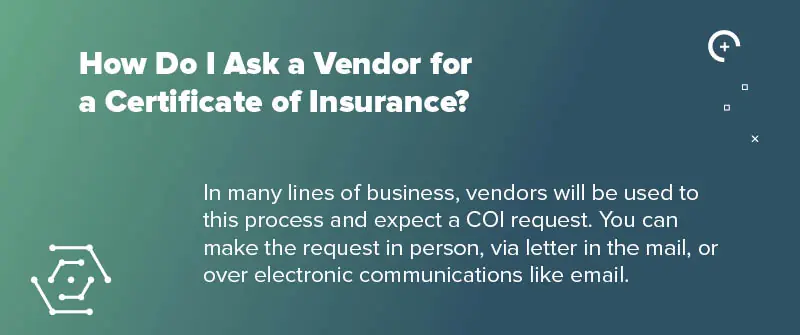
Running a business comes with a lot of inherent risks. With each new project you begin, product you launch, or employee you hire, you are adding a new layer of risk to your operations.
The modern solution that we’ve found for mitigating these risks, and protecting yourself and your company from financial fallouts, is insurance. Insurance providers, in exchange for a monthly payment (also known as a premium), agree to cover financial obligations from an agreed-upon situation, offering financial protection for everyone involved from potential damages.
One very risky but very common practice in many industries is to hire external vendors and third-party service providers, who may not come with their own insurance. These entities are often more specialized in their work and are hired out on a per-project basis, making them easy to work with for things such as construction projects or supply deliveries.
However, you must make sure that any third party you hire comes with an appropriate level of insurance coverage. For example, contractors need to make sure they have coverage for property damage. Today, companies typically do this through insurance certificates, also known as a certificate of insurance services or COI.
In this blog, we’ll break down the basics of COI management: how to get an insurance certificate, what’s in it, and how one small document can lead to large savings.
What Must Be Included in a Certificate of Insurance?
Certificate of Insurances are like insurance policy documents—but shortened to be about one page in length. Acting as evidence of someone’s liability coverage, they communicate all of the major policy information, such as the type of general Certificate Of Liability Insurance ACORD being provided (for example, workers compensation insurance), who (which insurance agency) is providing it, and who (the policyholder) is being covered. These are standard documents throughout the entire insurance industry.
A COI will also include details pertinent to the policy’s length, such as the effective dates of coverage and its expiration date. Finally, the document will denote who is receiving this proof of coverage, and someone at your company will be listed as the certificate holder.
How Do I Get an Insurance Certificate?
In order to verify that someone has an adequate level and timespan of insurance coverage for your particular project or partnership, you should get a COI from them. Remember that only an actual general liability insurance policy document or a much more succinct certificate of insurance can provide proof of someone’s coverage. In order to get a COI from someone you want to work with, you simply have to ask them or make a formal request.
How Do I Ask a Vendor for a Certificate of Insurance?
Asking a vendor for a certificate of insurance is easy! In many lines of business, vendors will be used to this process and expect a COI request to prove business insurance. You can make the request in person, via letter in the mail, or over electronic communications like email.
Consider the following certificates of insurance best practices:
- The earlier you ask in advance of a job, the more likely you are to get a COI from someone in time for them to begin working with you.
- You should not let someone start working on a job when you are unsure of their insurance coverage and coverage limits.
- Making a certificate of insurance request over email or mail is recommended as this will create a paper trail for your company in the case that their coverage status ever comes into question.

How Do I Generate a Certificate of Insurance?
The actual generation of a COI document is a practice that can only be done by one entity: the insurance company providing a policyholder with coverage, and it is generally covered in the insurance cost. Once a vendor receives a request for proof of their coverage (presumably from a prospective hiring party), they’ll go to their insurer online or in person and ask to get a new COI drawn up for them. The insurer will then issue it and deliver it back to them within a few business days.
Who Is Issued a Certificate of Insurance?
Once created, a COI is either returned to the policyholder whose coverage it is proving or directly to the hiring/external entity that requested it. This requester becomes known in this process as the certificate holder, and they (you) are the ones who will end up with the document in hand in order to verify that it meets their requirements for the partnership in question.
How Important Is a Certificate of Insurance?
Certificates of insurance are incredibly important across various industries and use cases. Any time a small business wants to work with someone new, an event is happening where people are exhibiting, or someone wants to work with a contractor in order to reduce their individual or company risk, they should be ready to request a COI.
Without adequate proof of coverage, you could be signing up for a world of trouble with compliance claims, regulatory or contractual breaches, or underinsured litigations possibly coming your way. Keep yourself and your contractors protected by doing your due diligence: requesting, verifying, and managing third-party COIs.
Why Should I Work With myCOI?
Looking for the best certificate of insurance services around to help you manage downstream risk? Our best-in-class software and skilled team of industry experts are here for you whenever you need them. Learn more and book a demo with us today.